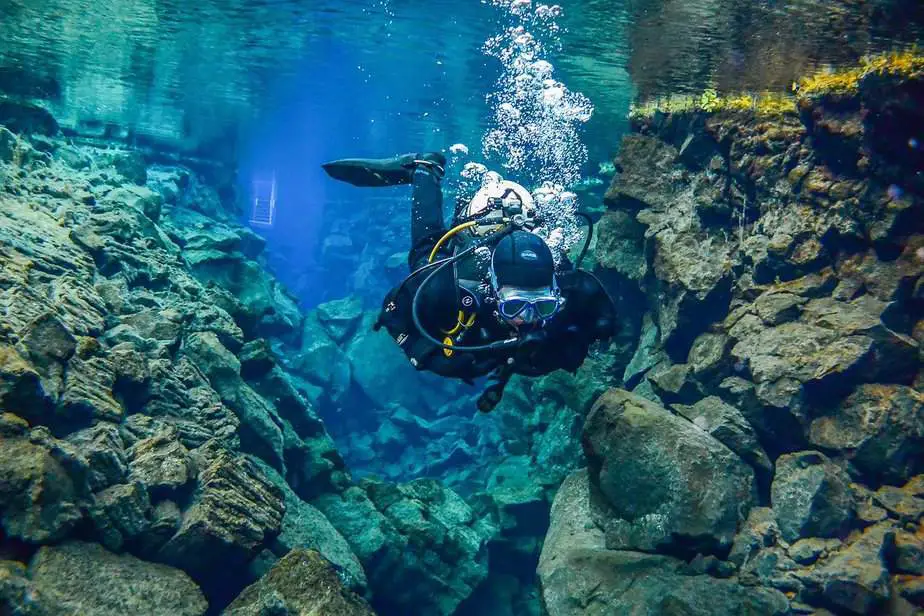If you believe that humans evolved from fish, then you should not be surprised that some people seem to be called by the sea. We may no longer have fins or gills, however that doesn’t stop us from exploring this underwater environment that we once called home. If you grew up in a landlocked state or have never personally been to the ocean, it’s normal to wonder what scuba diving feels like.
Whether it’s pondering what it’s like to breath underwater using a regulator, wearing all of that bulky and heavy scuba equipment, diving to depths of 100 feet or more and being subject to the ensuing pressure, the feeling of weightlessness, and many other things in scuba diving that you might want to discover the feel for.
In this article, we’ll go over the various sensations and experiences you’ll likely encounter while scuba diving. Some of them feel amazing, some of them can be quite terrifying. However, after the initial learning period, scuba diving should give you a sense of freedom, curiosity, and depending on the type of diving you plan to do, calmness or excitement that’s tough to beat.
What do scuba divers feel when they dive?
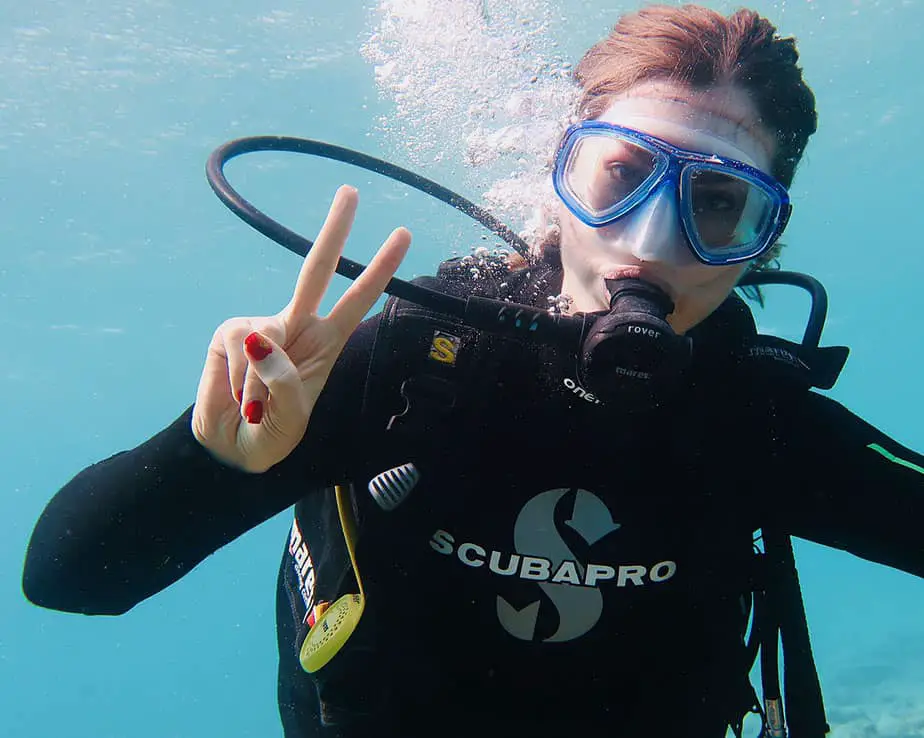
When you’re just starting out, scuba diving can be a harrowing experience. Many people are turned off when they realize they need to be decent swimmers and need to take a course to get certified. The first few dives you do will be stressful since there’s probably a hundred things going through your head that you only just learned recently.
You may also be nervous because you lack confidence in your swimming skills or the scuba theory. Depending on the dive site, you may even be intimidated by how rough the currents are or how deep the bottom is. All of these fears stem from a lack of experience. Once you’ve got a few dives under your belt, these worries should be a thing of the past.
After the initial hurdle, many divers and ocean lovers go scuba diving to escape from the stresses of life. In the ocean, there’s no phones, internet, nobody vying for your attention; it’s an introvert’s paradise. Your companions are now fish and you get to unwind in a world full of peace and tranquility.
There is also a phenomenon that occurs in our bodies called the Mammalian Diving Reflex that causes our heart rate and blood pressure to decrease once we’re submerged. The purpose of this is to conserve air and help us dive for longer which increases our chances of survival. It also contributes to the relaxing experience.
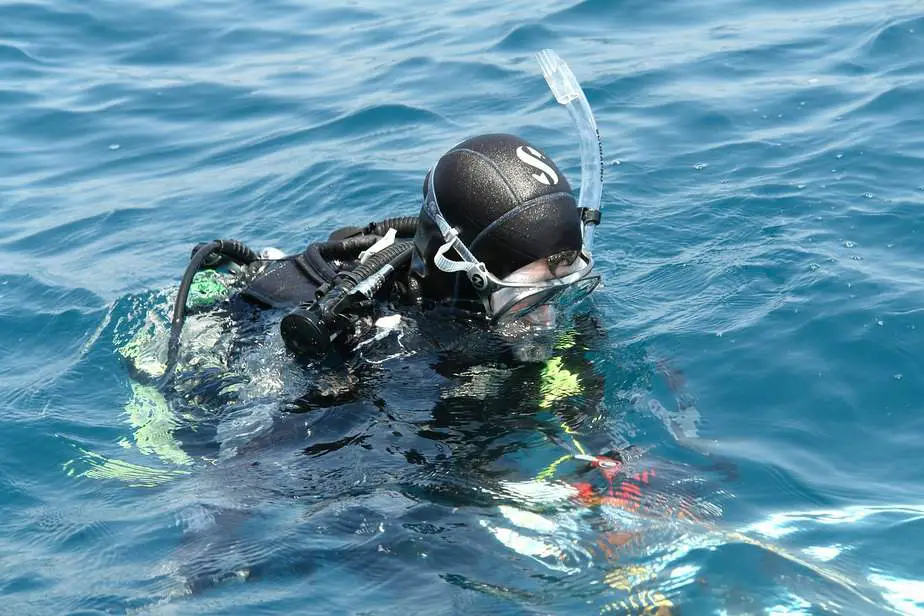
So it seems like we’re contradicting ourselves a bit. Is scuba diving an extreme sport, or is it a boring pastime for you to do some zen meditation? It depends on where you’re diving and the weather conditions the day of the dive that can cause it to have such variance in what it feels like.
One of the most popular locales for diving, the tropics, is famous for its warm, clear waters and idyllic weather conditions most of the year. It’s usually recommended that divers wear a wetsuit, however they may be able to get away with just a rashguard when diving in warm waters.
When you’re diving in a tropical dive site, you will feel what most divers would describe as a feeling of freedom. Once you’ve mastered buoyancy control, you can move 360 degrees in all planes using only your fins for an unparalleled sense of freedom. In fact, this freedom is often compared to floating in space.
Does scuba diving feel like floating in space?
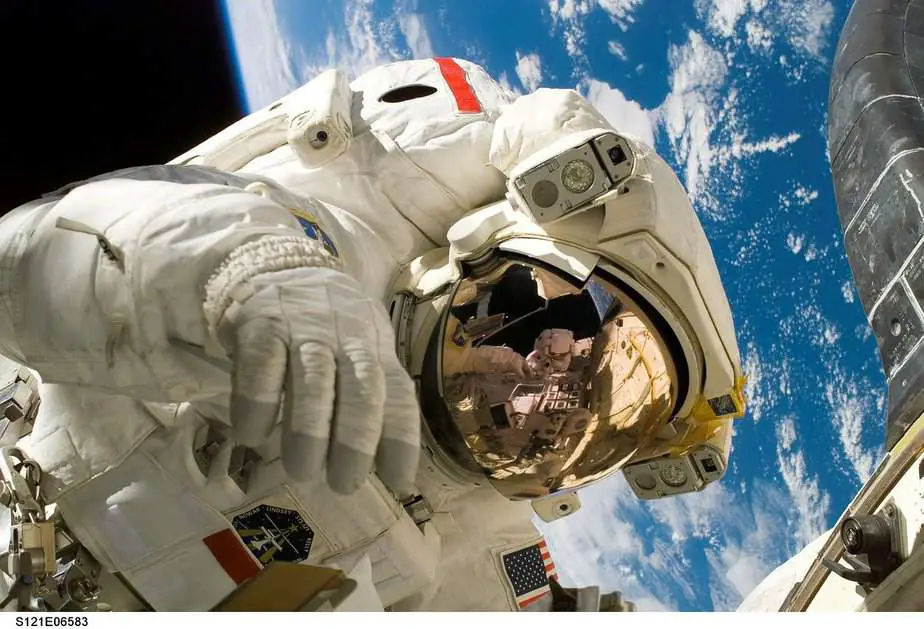
While I haven’t personally floated in space, therefore I cannot confirm if floating underwater is just like floating in space, I think it really says something when even NASA has built a special Astronaut Training Pool, a.k.a. The Neutral Buoyancy Lab, to train their astronauts. All astronauts must first dive in this pool before they head to space.
We aren’t surprised why this is part of the astronaut training process. Even just thinking about it logically, scuba diving really is similar to floating in space. First, both divers and astronauts wear an exposure suit to protect themselves from the harsh environment, they both have to use an air supply, and they both get to experience movement while not bound by the earth’s gravity.
So unless humanity is able to make a mass migration into space in the near future or you plan on becoming an astronaut, the closest thing you can do to experience the sensation of floating in space is to go scuba diving.
What you need to do is use your BCD until you reach neutral buoyancy which is the point where you are neither ascending or descending, and it’s just like you’re an astronaut floating in space.
What does scuba diving feel like the first time?
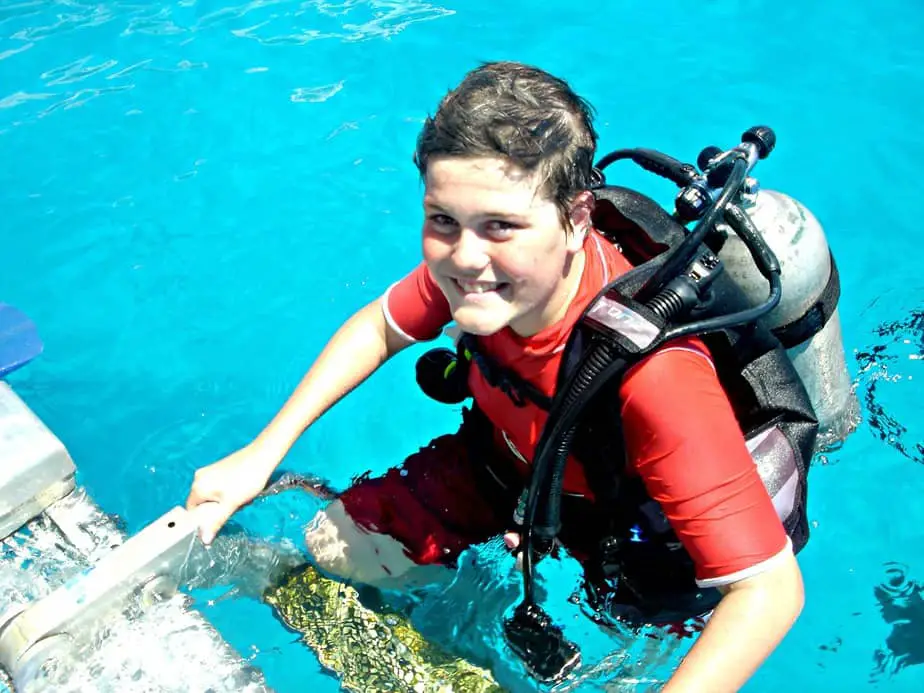
The first time you head underwater, you may understandably feel a little unusual. For your entire life, you were conditioned to hold your breath underwater. You’ve probably had a few experiences where you inhaled water and choked it right back out. Now, you must tell yourself that it’s okay to breathe underwater with your mouth instead of your nose, and you must do so in a calm manner.
If you’re not a particularly strong swimmer, you may also understandably feel a bit anxious. The weight of your scuba equipment is quite heavy, often reaching 40 pounds or more on land. Diving backwards into the ocean with all of that heavy equipment seems like suicide. However, you’ll learn about a concept called buoyancy which is that the water effectively pushes back against you, which is why something as large and heavy as a ship can float.
While each diver may have their apprehensions, you can keep them in check by preparing for your scuba diving course sensibly. Assuming you do not have a crippling fear of the water, most people should quickly overcome their fears as they are guided by their instructor.
Often the anticipation of heading into the water is more nerve-wracking than once you’re in it. With all of your equipment on, you will feel quite bulky and perhaps a little sluggish underwater. Depending on how thick your wetsuit is, you may even feel like your range of motion is limited.
It can be a bit tricky to maneuver around, especially since you are taught only to use your fins. If you’re worried about the cold, don’t worry; your wetsuit should be keeping you warm the entire time.
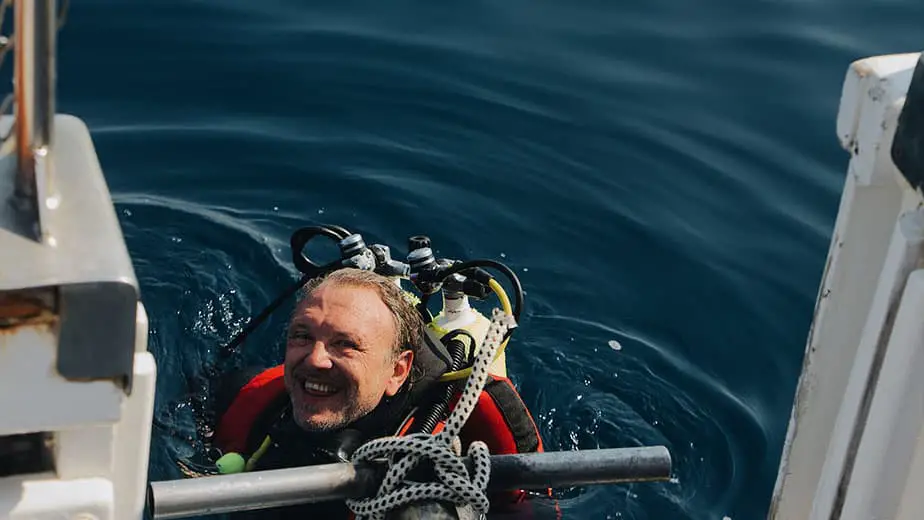
Let’s also get this out of the way: if you feel like peeing, don’t feel embarrassed. Immersion diuresis is a common phenomenon when your body is exposed to the water; basically urine production is increased and therefore you’ll feel like peeing. The pee will quickly be washed out and you can give the suit a nice scrub with soap if you feel like it smells.
You should also get used to the bubbles that your regulator expels when you exhale. The bubbles are surprisingly loud and they may tickle your face as they rise up.
Some divers can feel claustrophobic and this can be a real issue if your dive mask is too narrow. We recommend using either a frameless scuba mask or a dive mask with side windows so you can have the widest vision possible, reducing the feeling of claustrophobia.
If you have a general feeling of discomfort, generally this passes very quickly as you get used to the bubbles, the noise, the resistance of the water and how to navigate through it. If you’re worried about your lack of scuba experience, we highly recommend taking the Discover Scuba course for you to personally feel what it’s like to dive for the first time.
How does it feel to wear scuba gear?
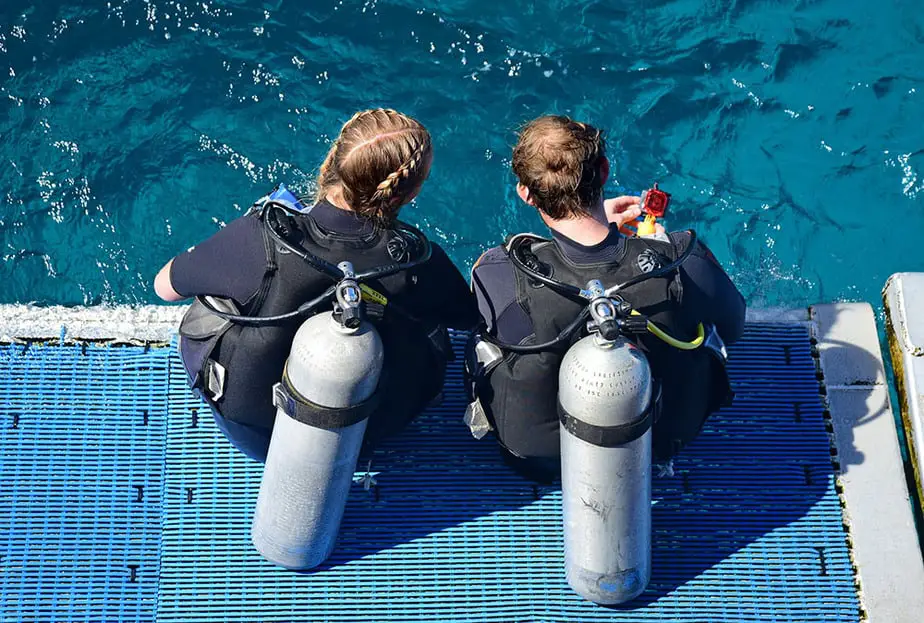
A complete scuba kit with scuba cylinder, regulator, and BCD, including the weight belt, can weigh a total of 25 kg / 55 lbs on land, so it’s pretty heavy to walk around in. Just a full scuba tank alone can comprise 15-20 kg of that weight.
Now as we already mentioned, you’re not going to sink like a rock once you dive into the water. Believe it or not, scuba tanks can float. Your wetsuit and fins are quite buoyant as well. Then there’s the BCD – which stands for buoyancy control device or buoyancy compensator. You bet the BCD can float. That’s the reason why you need to wear a weight belt in the first place, because otherwise you won’t be able to descend!
In order for you to really thrive underwater, you must be in control of your buoyancy. By managing your BCD, you decide when you want to descend, ascend, or stay where you are (neutral buoyancy).
At neutral buoyancy, you will experience that sensation of weightlessness kind of like floating in space that we talked about earlier. So despite being encumbered by all of this heavy gear, you can find yourself suspended in the water, neither sinking nor rising, free to maneuver yourself how you want.
With that said, the bulkiness of your equipment can create significant water resistance. You need to rely on your fins and powerful legs to propel yourself in the direction you want.
Is it hard to breathe underwater?
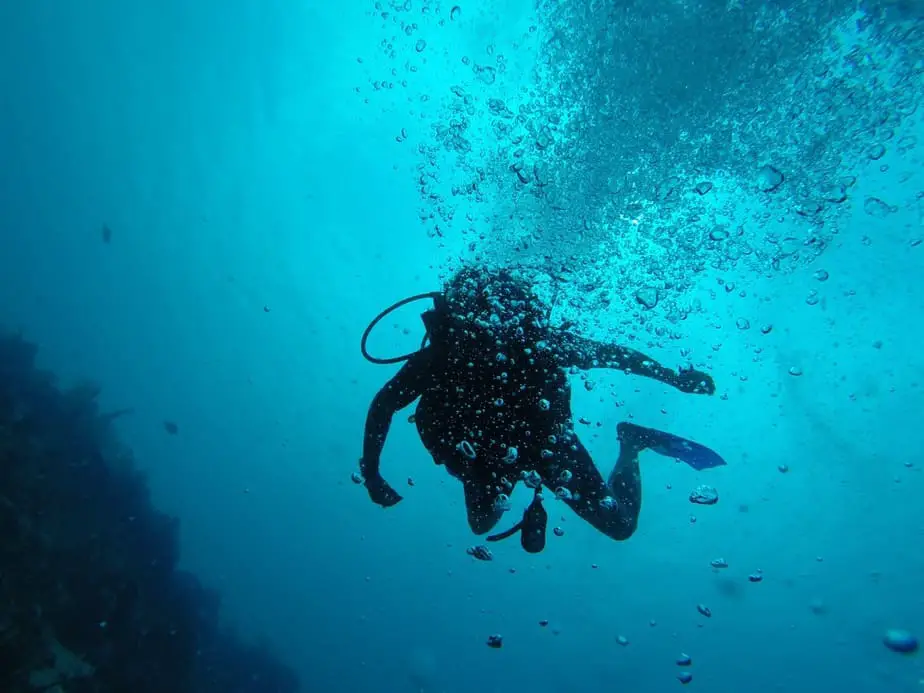
In order to breathe underwater, you must use a piece of equipment called a regulator. The regulator is responsible for taking the compressed breathing gas from your scuba cylinder and reducing the pressure to a safe level for you to breathe. The part that goes into your mouth is called the demand valve and it gives you air when you inhale.
Obviously, since the demand valve goes into your mouth, you can only breathe underwater with your mouth. While the term “mouth breather” is an insulting term, underwater everybody is a mouth breather. Once divers get used to it, they’ll find that breathing through the regulator is easier than breathing through the snorkel because the air is conveniently delivered to you.
Back when dive equipment was not as sophisticated, regulators were hard to breathe from and got harder the deeper underwater you went. Nowadays, modern regulators are “balanced” meaning they are designed to be easy to breathe from regardless of the pressure.
However, you can still feel what it’s like to have not enough air. You must keep a close watch on your pressure gauge to know roughly how much time you have left. If you run out of air, then you’ll need to signal to your dive buddy that you need to share air with them.
You can also get a sensation of not having enough air if you’re too nervous and you hyperventilate. When you start out, the anxiety and stress of diving can cause people to react differently. You must always try to remain calm by taking long, deep breaths, and exhaling slowly as well.
In the Open Water Diver course, before you head into the open water, you will first start off in a confined area, typically a pool, where the water is calm and shallow enough that you can stand up in. Here, you will practice breathing slowly and deeply underwater using the regulator.
Also, during the real thing, you will be diving with a buddy. You are not alone, and your instructor is looking out for you. You must learn to stay calm and trust the equipment, the instructor, and in yourself. Often standing in that shallow pool and taking your first breaths underwater is enough to overcome the mental block you may have about diving, and you will begin to feel relaxed.
How do you feel after scuba diving?
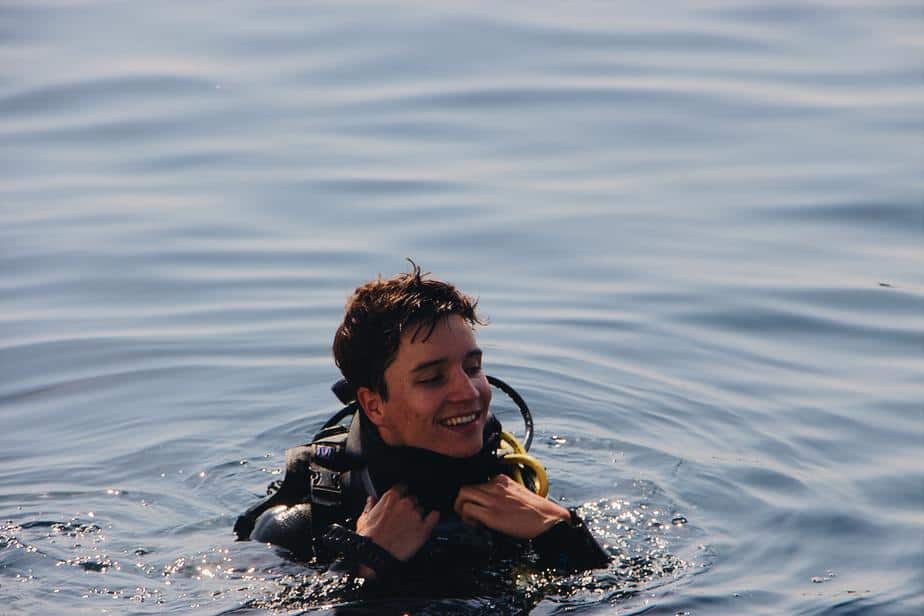
After scuba diving, physically you will feel tired, thirsty and hungry. Scuba diving is a physically demanding sport – your bulky equipment will create drag, and spending an hour fighting against the water resistance of your gear and possibly rough currents will fatigue you. It’s not unusual for you to burn 500-600 calories on a 45 – 60 minute dive.
There are foods you should be eating before and after scuba diving to fuel your body. Conversely, there are things NOT to do before scuba diving as well as foods to avoid which can negatively impact your dive.
Now how do you feel emotionally after scuba diving; feelings can range but hopefully they will be more positive than negative. If you are a beginner diver, then each dive will probably blow your mind because of the wide variety of marine life you’ll encounter each time.
Sometimes there are questions you want to ask or things you want to say while you’re underwater. However, the regulator makes it hard to speak underwater, holding a conversation on a dive slate is tedious, and hand signals are only effective for basic communication.
In other words, you’re probably bottling everything up and can’t wait to talk to people about it once you’re back on the boat or beach. Depending on how tired some of the divers are, they may not share the same enthusiasm as you about talking, so don’t feel bad if they aren’t too responsive.
You’ll probably want to tell all of your family and friends about your diving experiences, and you’ll hopefully remember these experiences for a long time. Keen divers will review their dive data and discuss strategies with dive buddies to make the next dive even smoother. Beginner divers can get a formal debrief from their divemaster or instructor to understand how the dive went.
After a dive, assuming everything went according to plan and you saw what you wanted to see (sometimes you find rare things you don’t expect to see, such as the odd manta ray or dolphin), then you’ll probably feel pretty good after a dive. Make sure to replenish yourself by drinking water or a sports drink, and eat plenty of fruits, vegetables, grains, nuts, and lean meats.
How does it feel to equalize?
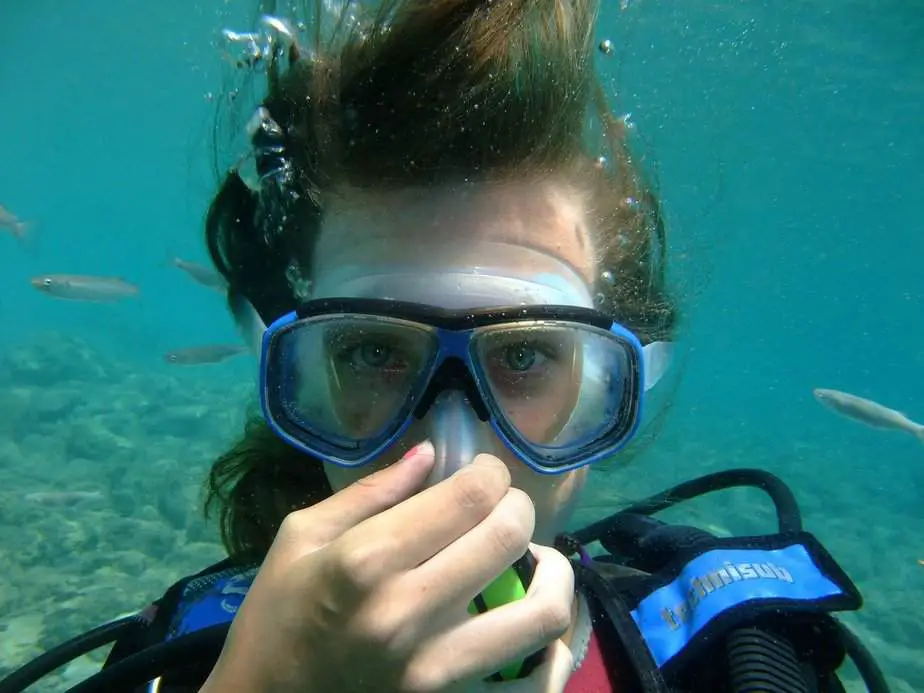
You probably know that the deeper you dive, the stronger the water pressure gets. If you’ve ever been up a mountain or on a plane then you have already experienced what equalization feels like.
If you haven’t experienced this, you’ll feel a tightness in your ears and sinuses when you go from a lower pressure environment to a higher pressure one. This is exactly what you’ll feel as you dive deeper. Since the water pressure is greater than what you experienced on land, you’ll feel the pressure faster and more painfully if you don’t equalize.
When the pressure builds up in your ears and sinuses, you can begin to feel pain which can even result in barotrauma (a pressure injury) if you descend too quickly without equalizing. One of scuba diving’s golden rules is to equalize early and often (some other good ones are plan your dive, dive your plan, and all dives are decompression dives).
It’s really easy to equalize. You just need to pinch your nose through your dive mask’s nose pocket and gently blow against it. This is called the Valsalva maneuver and chances are you already know about it. You’ll also have to clear your mask by occasionally exhaling with your nose. Easy-peasy, right?
You’ll know you’ve successfully equalized when you hear a “pop” in your ears and the tight feeling is gone. You will feel a sense of relief because it feels good to have your ears and sinuses in normal working order. It’s important that you equalize long before you feel any pain or discomfort.
How does it feel to dive in the tropics vs. elsewhere?

Diving in a tropical destination is a luxury for divers. It may seem “easier” than others because the warm waters and calm conditions makes it harder for things to go wrong.
You don’t even necessarily need to wear a wetsuit because the water temperature is about 30°C / 86°F. Now granted, water is extremely good at taking heat from our body than air (about 20x faster), so if you’ll be staying in the water for hours, then even in warm water you’ll still end up shivering.
Another benefit of not even needing a wetsuit is that you need even less lead weights to dive, because you don’t have to account for the extra buoyancy the wetsuit provides anymore. This can reduce the weight of your scuba kit by up to half compared to cold water diving.
When you’re less encumbered, then it’s even easier to move underwater. So not only are you more comfortable on land, but it feels like a dream when you’re swimming with much less bulk and drag than you normally would have.
When there’s less weight to worry about, managing your buoyancy with your BCD also becomes much easier. You’ll need less air overall to reach neutral buoyancy because there is less buoyancy to compensate for. With that said, compared to cold water, saltwater is naturally more buoyant and you’d still need more dive weights compared to altitude diving, for instance.
Furthermore, tropical dive sites generally have better visibility unless it’s completely filled with other divers who may kick up a storm. Also, vacationing in the tropics means there’s more time to sunbathe between dives, so overall it feels enjoyable.
Parting words
Scuba diving offers plenty of unique experiences and it feels amazing to dive with family or friends. There will be an adjustment period as you get used to breathing underwater and learn how to efficiently maneuver yourself.
However, once you’ve got a few dives under your belt, you’ll gain confidence in your diving ability and know how to stay safe during a dive. Then, instead of feeling nervous or scared before a dive, you’ll instead feel more positive emotions. A scuba dive can be exhilarating, relaxing, educational, social, and enjoyable all at the same time.
Once you’ve gotten bit by the diving bug, you’ll crave the feeling of freedom that scuba diving gives you. It doesn’t matter if you’re young or old, it’s something you’ll want to experience again and again. If you haven’t done it yet, it’s definitely worth trying out.

